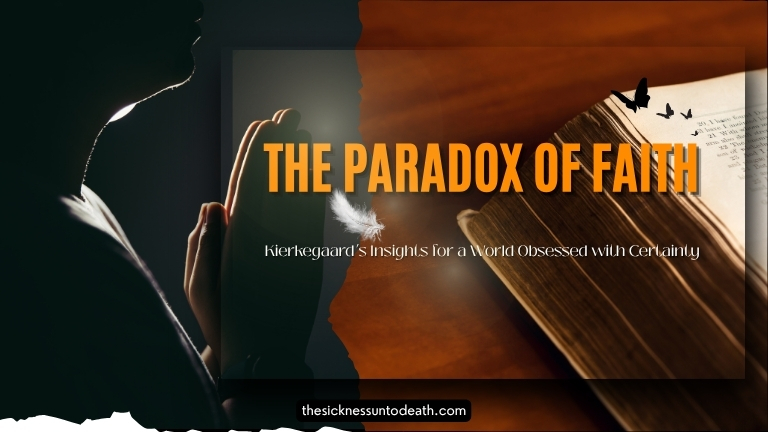We live in an age that craves clarity. From self-help books to scientific data, we’re constantly looking for answers that promise certainty, control, and predictability. But what happens when life doesn’t follow the script—when we’re faced with choices, losses, or doubts that logic alone can’t solve? Søren Kierkegaard, the Danish philosopher and theologian, offers an unexpected answer: faith.
For Kierkegaard, faith isn’t the opposite of thinking. It’s not blind or irrational. Instead, it’s something much deeper and more challenging. He called it a “paradox”—because true faith asks us to let go of certainty and trust in something we can’t fully prove or explain.
Faith Begins Where Certainty Ends
Kierkegaard argued that modern life often traps us in what he called the “aesthetic” or “ethical” stages—modes of living where we try to master life through pleasure, achievement, or moral effort. But eventually, we hit a wall. Sooner or later, the world’s answers start to feel thin.
It’s here, in this space of tension, that faith becomes possible. According to Kierkegaard, faith isn’t about having all the answers—it’s about making a leap when the answers run out. It’s a commitment to trust in God even when the road ahead is unclear.
The Courage to Let Go
In today’s world, letting go of control can feel terrifying. We’re encouraged to plan, analyse, and optimise every corner of our lives. Kierkegaard’s insight was that this obsession with control often keeps us from living authentically.
Faith, he said, involves risk. It means saying yes to a deeper truth even when it doesn’t align with reason or the world’s approval. This leap of faith isn’t reckless—it’s relational. It’s grounded in a trust that God is real, present, and trustworthy, even when life is uncertain.
Why This Still Matters
Kierkegaard’s paradox is more relevant now than ever. We live in a culture of constant comparison and performance. We’re overloaded with information but still searching for meaning. Faith offers a different kind of freedom—the freedom to live truthfully, even when certainty is out of reach.
Instead of striving for control, faith calls us to surrender. Instead of chasing perfection, it invites us to rest in grace. It’s not easy. It requires inwardness, reflection, and the courage to stand apart from the crowd. But for Kierkegaard, this is where real life begins.
👉 Want to explore more of Kierkegaard’s thought?
Check out The Sickness Unto Death: A Modern Translation for the 21st Century at www.thesicknessuntodeath.com — a clear and accessible way to engage with his timeless wisdom in today’s language.

